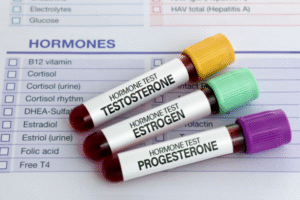 Understanding the FDA Decision to Lift the Black Box Warning
Understanding the FDA Decision to Lift the Black Box Warning
The recent decision by the U.S. Food and Drug Administration (FDA) to lift the black box warning on menopause hormone therapy marks a pivotal moment in women’s health care. For decades, the black box warning, the FDA’s caution, has signaled serious risks associated with hormone therapy, particularly regarding heart disease, stroke, blood clots, and breast cancer. This prominent warning shaped both public perception and clinical practice, often causing women and healthcare providers to shy away from a treatment that could alleviate severe menopausal symptoms.
The FDA’s move to revise its stance is grounded in evolving scientific evidence. Over the past several years, multiple large-scale studies and expert reviews have indicated that, for many women, especially those who begin hormone therapy near the onset of menopause and use it for a limited time, the benefits can often outweigh the risks. These findings suggest that the original warning did not sufficiently account for the nuances of patient age, health status, and duration of treatment. The decision reflects a more individualized approach to menopause management, empowering women and clinicians to weigh the pros and cons based on personal health profiles rather than broad, one-size-fits-all cautionary statements.
This regulatory shift does not mean menopause hormone therapy is risk-free; instead, it acknowledges a more balanced perspective supported by up-to-date research. As a result, the FDA is encouraging informed, shared decision-making between women and their healthcare providers, ensuring that choices about hormone therapy are tailored to each woman’s unique needs and circumstances.
What the Black Box Warning Meant for Hormone Replacement Therapy
For years, the black box warning on menopause hormone therapy (HRT) cast a shadow of caution over both physicians and patients considering this treatment. A black box warning is the Food and Drug Administration’s (FDA) most stringent alert for prescription medications, signaling the possibility of serious or even life-threatening risks. When it comes to hormone replacement therapy, this warning was introduced in response to large-scale studies, such as the Women’s Health Initiative (WHI), which indicated potential links between HRT and increased risks of breast cancer, heart disease, stroke, and blood clots.
This prominent warning label was printed in bold at the top of prescription information and packaging, serving as a constant reminder to healthcare providers and patients about the possible severe adverse effects. As a result, the black box warning heavily influenced medical decision-making. Many women, particularly those experiencing moderate to severe menopausal symptoms like hot flashes, night sweats, and osteoporosis, either avoided HRT altogether or discontinued it prematurely. The stigma and fear surrounding hormone replacement therapy led to a sharp decline in prescriptions, despite its proven effectiveness in relieving menopausal symptoms and improving quality of life for countless women. https://www.healio.com/news/womens-health-ob-gyn/20240913/hormone-therapy-use-among-menopausal-women-continues-to-decline-despite-proven-safety
By shaping perceptions and prescribing habits, the black box warning effectively limited access to an important therapeutic option. Understanding the historical weight of this warning is essential to appreciating the significance of the FDA’s recent decision to lift it. This is a move that reflects evolving research and a more individualized approach to menopause management.
Key Reasons Behind the FDA’s Updated Stance
Recently, the U.S. Food and Drug Administration (FDA) announced the removal of the black box warning on menopause hormone therapy, signaling a pivotal shift in the medical community’s perception of these treatments. This decision stems from a rigorous reevaluation of clinical evidence, which illuminated new insights about the actual risks and benefits associated with hormone therapy for menopausal symptoms.
Historically, the black box warning, reserved for medications with significant or life-threatening risks, was implemented due to concerns highlighted by earlier studies linking hormone therapy to an increased risk of cardiovascular events, breast cancer, and strokes. However, recent comprehensive analyses have revealed that these risks are not universal. Instead, they vary substantially based on a woman’s age, time since menopause onset, and the type and duration of hormone therapy prescribed. 2002: https://www.cbsnews.com/news/hrt-for-menopause-risks-benefits-fda-black-box-warnings/
Key Factors Driving the Change
- Improved Risk Stratification: Modern research underscores that healthy women under 60, or within 10 years of menopause onset, experience a much lower risk profile than previously thought. – https://hsph.harvard.edu/news/hormonal-therapy-menopause
- Personalized Treatment Approaches: The FDA recognized that individualized hormone therapy, tailored to each woman’s unique health history and symptom severity, offers a more favorable risk-to-benefit ratio. https://www.fda.gov/patients/fda-expert-panels/fda-expert-panel-menopause-and-hormone-replacement-therapy-women-07172025
- Enhanced Safety Protocols: Advances in screening and monitoring have further mitigated potential adverse effects, allowing for safer administration of hormone therapy.
This recalibrated stance aligns with current scientific consensus, ultimately empowering women and healthcare providers to make more informed, personalized decisions about menopause management. The FDA’s updated guidance marks a new era in the understanding and application of hormone therapy, fostering renewed confidence in its appropriate use.
Implications for Women Considering Menopause Hormone Therapy
The FDA’s recent decision to lift the black box warning on menopause hormone therapy (MHT) marks a pivotal shift in the landscape of women’s health. For years, the presence of this stark warning signaled heightened risks and prompted both clinicians and patients to approach hormone therapy with caution. Now, with the removal of this label, women contemplating MHT are presented with a new framework for evaluating their treatment options.
This change carries profound implications. Women experiencing moderate to severe menopausal symptoms – such as hot flashes, night sweats, and vaginal dryness, may now feel more empowered to initiate conversations about hormone therapy with their healthcare providers. The updated regulatory stance could reduce stigma and hesitancy, fostering a more open dialogue about the potential benefits and risks.
Personalized Decision-Making
- Broader eligibility: Women previously deterred by the black box warning may now reconsider hormone replacement therapy as a viable solution for symptom relief.
- Risk assessment: While the warning has been lifted, individualized risk evaluation remains essential. Age, medical history, and symptom severity should guide therapy decisions.
Additionally, the update encourages a balanced perspective: MHT is neither universally safe nor inherently dangerous. Instead, the therapy’s appropriateness hinges on careful consideration of each woman’s unique needs and health profile. Ultimately, the FDA’s move invites women to weigh menopause hormone therapy as one of several options – opening the door to improved quality of life through informed, shared decision-making.
What Patients and Healthcare Providers Should Know Moving Forward
The recent decision by the FDA to lift the black box warning on menopause hormone therapy marks a pivotal moment for both patients and healthcare providers. Understanding the implications of this change is essential as it influences future treatment decisions, communication, and overall patient care. In the wake of this development, both groups must remain informed about the benefits, risks, and evolving recommendations regarding hormone therapy for menopause.
Empowering Patients with Accurate Information
For patients, this change offers an opportunity to revisit conversations about symptom management and quality of life during menopause. The removal of the black box warning signals that, for many women, the risks previously associated with hormone therapy may not be as broadly applicable as once believed. However, it is crucial for patients to recognize that hormone therapy is not a one-size-fits-all solution; individual health history, age, and specific symptoms all play a role in determining the best course of action. Open dialogue with healthcare providers remains vital, encouraging women to ask questions, voice concerns, and make decisions with confidence.
Guidance for Healthcare Providers
Healthcare professionals must stay up to date with the latest research and guidance, ensuring that recommendations are tailored to each patient’s unique profile. With the black box warning lifted, providers have an enhanced ability to discuss the nuanced benefits and potential risks of hormone therapy without undue alarm. Emphasizing evidence-based practices and shared decision-making will help foster trust and optimize outcomes.
As the landscape of menopause management evolves, the FDA’s decision underscores the importance of ongoing education, clear communication, and patient-centered care, setting the stage for more personalized and effective treatment strategies in the years ahead.

